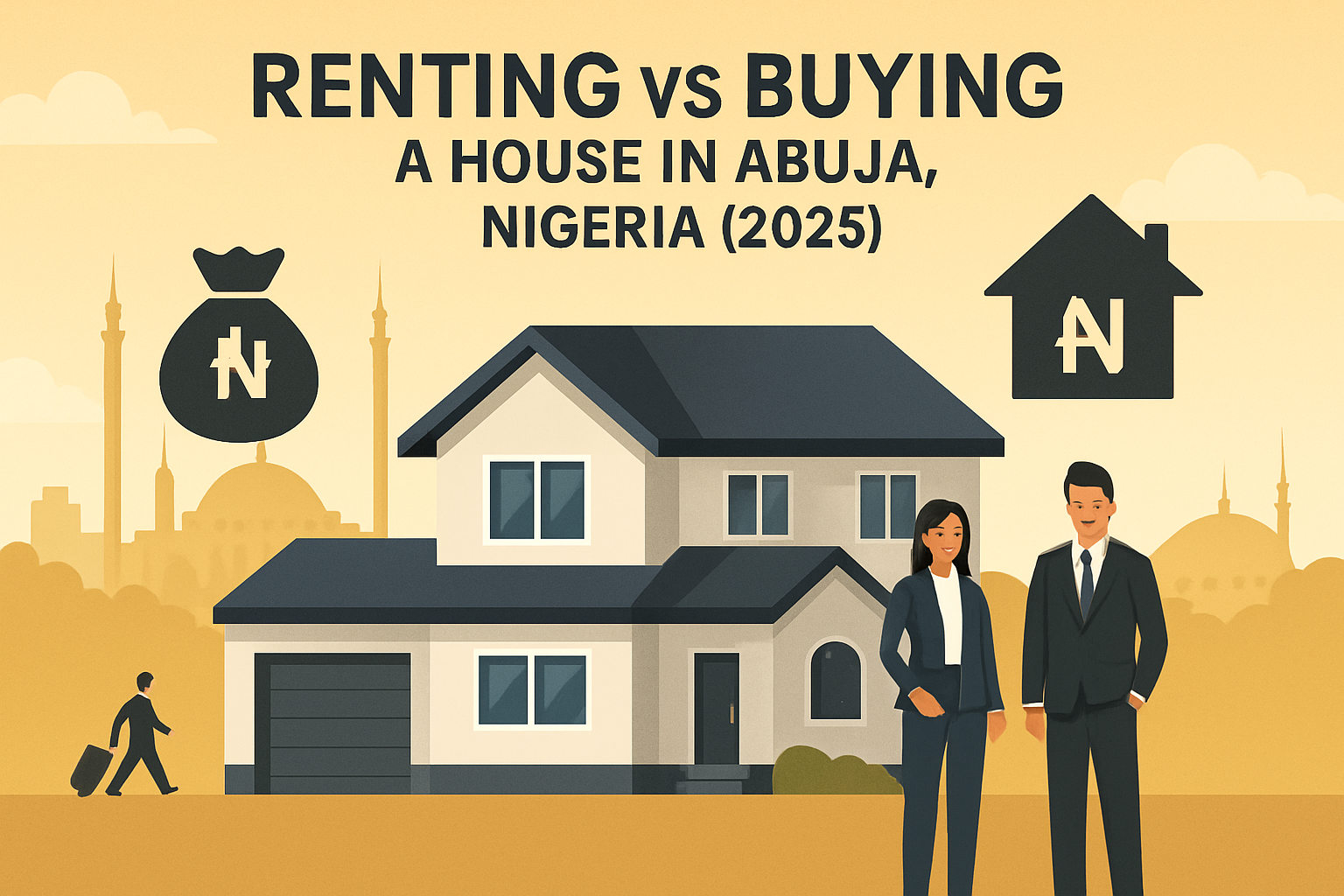Address
No. 4 Akande SB Street, Kado, Abuja.
Work Hours
Monday to Friday: 7AM - 7PM
Weekend: 10AM - 5PM
Address
No. 4 Akande SB Street, Kado, Abuja.
Work Hours
Monday to Friday: 7AM - 7PM
Weekend: 10AM - 5PM

Deciding between renting and buying a house in Abuja is a major financial and lifestyle choice, especially in Nigeria's dynamic capital city. With rising property values, high inflation rates projected at 20-25% for 2025, and a growing population driving demand, understanding the pros and cons is essential. As experts at Arya Realties, a leading real estate firm in Abuja, we often guide clients through this decision.
Deciding between renting and buying a house in Abuja is a major financial and lifestyle choice, especially in Nigeria’s dynamic capital city. With rising property values, high inflation rates projected at 20-25% for 2025, and a growing population driving demand, understanding the pros and cons is essential. As experts at Arya Realties, a leading real estate firm in Abuja, we often guide clients through this decision. This article explores key factors like cash flow analysis, lifestyle considerations, and neighborhood accessibility to help you determine when renting or buying makes more sense in Abuja’s 2025 housing market.
At Arya Realties, we help clients—whether expats, first-time home seekers, or seasoned investors—navigate the Abuja property market to make the right decision.
Cash flow is often the deciding factor in the rent vs buy debate, as it directly impacts your monthly budget and long-term financial health. In Abuja, where the average house price hovers around ₦38 million for a standard property, buying requires significant upfront capital, while renting offers more predictable short-term expenses.
Purchasing a home typically involves a 20-30% down payment, which could mean ₦7.6 million to ₦11.4 million on a ₦38 million property. Add in legal fees (5-10% of the price), agency fees, and survey costs (₦500,000 to ₦5 million). Mortgage rates in Nigeria remain high at 18-25%, so for a ₦20 million loan over 15 years at 20%, you’d pay around ₦350,000 monthly which amounts to a total interest of over ₦43 million in interest overall. Ongoing expenses include maintenance and property taxes.
However, buying builds equity over time. Property appreciation in Abuja can reach 10-15% annually in prime areas, turning your home into an asset. If you plan to stay for 5+ years, the long-term cash flow benefits from equity growth and potential rental income often outweigh the initial costs.
Renting is more accessible upfront, with average annual rents for houses at ₦15 million, or about ₦1.25 million monthly. For smaller options, a two-bedroom flat might cost ₦2-2.5 million annually in suburbs, rising to ₦5-8 million in central areas. You’ll pay 1-2 years’ rent in advance, plus agency and legal fees (5-10% each) and a caution deposit.
The advantage? No maintenance burdens—landlords handle repairs—and lower risk from market fluctuations. Renting doesn’t build equity, so it’s better if your horizon is short-term (under 5 years) or if investing rent savings elsewhere yields better returns.
In summary, if your cash flow allows for high initial outlays and you value long-term savings, buying wins. For immediate affordability and flexibility, renting is superior, especially amid 2025’s inflation pressures.
Beyond finances, your lifestyle plays a crucial role in whether to rent or buy a house in Abuja. The city’s fast-paced environment, with its mix of professionals, families, and expatriates, means priorities like mobility and stability vary widely.
Renting shines for those with dynamic lifestyles. If you’re a young professional under 35 (comprising 60% of renters), frequent job changes, or short-term contracts (e.g., in government or NGOs), renting provides the freedom to relocate without the hassle of selling. It avoids landlord disputes—though 70% of renters face issues like deposit refunds—and lets you test neighborhoods before committing.
Buying, on the other hand, suits settled lifestyles. It offers emotional security, no eviction risks, and the ability to customize your space. Families planning long-term roots in Abuja benefit from stability, especially if building wealth through property is a goal. However, it ties you down, making it less ideal for nomadic or uncertain lifestyles.
At Arya Realties, we advise considering your career stage: Rent if flexibility is key; buy if you’re ready for permanence.
Abuja’s neighborhoods vary greatly in accessibility, influencing whether renting or buying is better. Prime areas like Maitama, Asokoro, and Wuse offer excellent connectivity to government offices, embassies, and amenities, but they’re pricey—rents here range from ₦3-10 million annually, and buying can exceed ₦200 million.
Renting allows easier access to these highbrow districts without the massive upfront cost, ideal if proximity to work (e.g., reducing commute times in traffic-heavy Abuja) or schools is priority. Emerging areas like Kado show strong growth, with house prices rising from ₦205 million in 2024 to ₦285 million in 2025, making buying a smart investment for appreciation.
Suburbs like Lugbe or Kubwa provide more affordable options (rents ₦800,000-₦1.2 million for one-bedrooms), but accessibility to central Abuja might involve longer commutes. If neighborhood perks like security, parks, and transport links matter most, renting lets you sample without commitment, while buying locks in long-term value in accessible spots.
In 2025’s Abuja housing market, renting is often better for short-term cash flow, lifestyle flexibility, and testing neighborhood accessibility, while buying excels for long-term equity, stability, and investment potential. With rentals dominating due to high demand and a 22 million national housing deficit, your decision hinges on personal circumstances.
At Arya Realties, we help clients crunch the numbers and find the perfect fit—whether it’s a luxury rental in Maitama or a family home purchase in a growing suburb. Contact us today for personalized advice on renting or buying a house in Abuja.